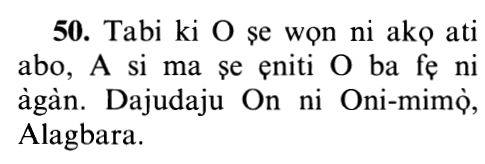42vs50
Select any filter and click on Go! to see results
أَوْ يُزَوِّجُهُمْ ذُكْرَاناً وَإِنَاثاً وَيَجْعَلُ مَن يَشَاءُ عَقِيماً إِنَّهُ عَلِيمٌ قَدِيرٌ
Aw yuzawwijuhum thukranan wainathan wayajAAalu man yashao AAaqeeman innahu AAaleemun qadeerun
Index Terms
Click to play
Yoruba Translation

Hausa Translation
Kõ kuma Ya haɗa su maza da mãtã, kuma Yanã sanya wanda Ya so bakarãre.(1) Lalle shi, Mai ilmi ne, Mai ĩkon yi.
Asbabu n-Nuzuul (Occasions of Revelation)
أَوْ يُزَوِّجُهُمْ ذُكْرَانًا وَإِنَاثًا ...
Or He bestows both males and females,
means, He gives to whomsoever He wills both males and females, sons and daughters.
Al-Baghawi said,
"Like Muhammad.''
... وَيَجْعَلُ مَن يَشَاء عَقِيمًا ...
and He renders barren whom He wills.
means, so that he has no children at all.
Al-Baghawi said,
"Like Yahya and Isa, peace be upon them.''
So people are divided into four categories: some are given daughters, some are given sons, some are given both sons and daughters, and some are not given either sons or daughters, but they are rendered barren, with no offspring.
... إِنَّهُ عَلِيمٌ ...
Verily, He is the All-Knower,
means, He knows who deserves to be in which of these categories.
... قَدِيرٌ ﴿٥٠﴾
and is Able (to do all things).
means, to do whatever He wills and to differentiate between people in this manner.
This issue is similar to that referred to in the Ayah where Allah says of Isa, peace be upon him:
وَلِنَجْعَلَهُ ءَايَةً لِّلْنَّاسِ
And (We wish) to appoint him as a sign to mankind. (19:21)
i.e., proof for them of His power, for He created people in four different ways.
*
Adam, peace be upon him, was created from clay, from neither a male nor a female.
*
Hawwa', peace be upon her, was created from a male without a female.
*
All other people, besides Isa, peace be upon him, were created from male and female,
*
and this sign of Allah was completed with the creation of Isa bin Maryam, may peace be upon them both, who was created from a female without a male. Allah says:
وَلِنَجْعَلَهُ ءَايَةً لِّلْنَّاسِ
And (We wish) to appoint him as a sign to mankind. (19: 21)
This issue has to do with parents, whilst the previous issue has to do with children, and in each case there are four categories. Glory be to the All-Knower Who is Able to do all things.
أي ويعطي لمن يشاء من الناس الزوجين الذكر والأنثى أي من هذا وهذا قال البغوي كمحمد صلى الله عليه وسلم " ويجعل من يشاء عقيما " أي لا يولد له قال البغوي كيحيى وعيسى عليهما الصلاة والسلام فجعل الناس أربعة أقسام منهم من يعطيه البنات ومنهم من يعطيه البنين ومنهم من يعطيه من النوعين ذكورا وإناثا ومنهم من يمنعه هذا وهذا فيجعله عقيما لا نسل له ولا ولد له " إنه عليم " أي بمن يستحق كل قسم من هذه الأقسام " قدير " أي على من يشاء من تفاوت الناس في ذلك وهذا المقام شبيه بقوله تبارك وتعالى عن عيسى عليه الصلاة والسلام " ولنجعله آية للناس " أي دلالة لهم على قدرته تعالى وتقدس حيث خلق الخلق على أربعة أقسام فآدم عليه الصلاة والسلام مخلوق من تراب لا من ذكر ولا أنثى وحواء عليها السلام مخلوقة من ذكر بلا أنثى وسائر الخلق سوى عيسى عليه السلام من ذكر وأنثى وعيسى عليه السلام من أنثى بلا ذكر فتمت الدلالة بخلق عيسى ابن مريم عليهما الصلاة والسلام ولهذا قال تعالى " ولنجعله آية للناس " فهذا المقام في الآباء والمقام الأول في الأبناء وكل منهما أربعة أقسام فسبحان العليم القدير .
"أو يزوجهم" أي يجعلهم "ذكرانا وإناثا ويجعل من يشاء عقيما" فلا يلد ولا يولد له "إنه عليم" بما يخلق "قدير" على ما يشاء
قال مجاهد : هو أن تلد المرأة غلاما ثم تلد جارية ثم تلد غلاما ثم تلد جارية . وقال محمد بن الحنفية : هو أن تلد توأما , غلاما وجارية , أو يزوجهم ذكرانا وإناثا . قال القتبي : التزويج هاهنا هو الجمع بين البنين والبنات ; تقول العرب : زوجت إبلي إذا جمعت بين الكبار والصغار .
I'raab - grammatical analysis of the Qur'an
«أَوْ» حرف عطف «يُزَوِّجُهُمْ» مضارع ومفعوله والفاعل مستتر «ذُكْراناً» حال «وَإِناثاً» معطوف على ذكرانا والجملة معطوفة على ما قبلها «وَيَجْعَلُ» الواو حرف عطف ومضارع فاعله مستتر «مَنْ» مفعول به أول والجملة معطوفة على ما قبلها «يَشاءُ» مضارع فاعله مستتر «عَقِيماً» مفعول به ثان والجملة صلة من «إِنَّهُ عَلِيمٌ» إن واسمها وخبرها الأول «قَدِيرٌ» خبرها الثاني والجملة الاسمية تعليل
